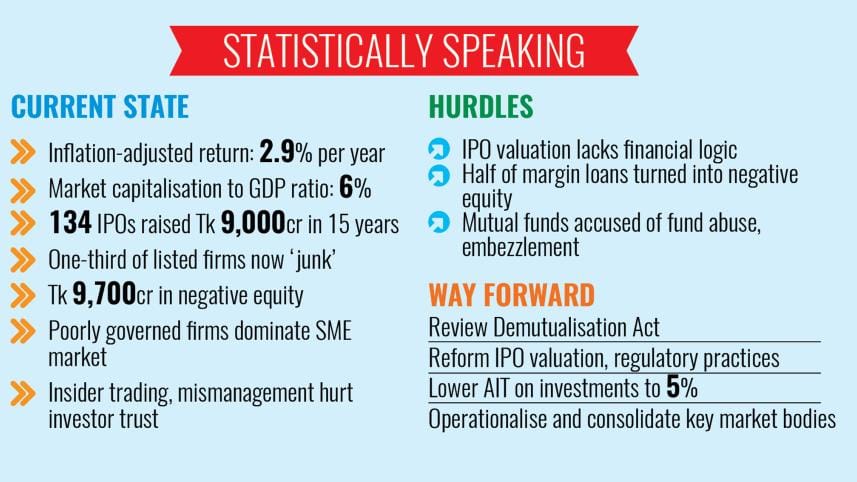Stock market shrank 38% over 16-year span

The stock market has declined 38 percent in real value over the past 16 years, largely due to negative returns and poor management practices. While some companies showed growth, widespread mismanagement limited overall income generation.
Combined with high inflation, these factors eroded the market's real value, leaving investors holding the bag.
A discussion by Dhaka stockbrokers yesterday elaborated on the market missteps, including political interference and inconsistent regulatory actions, which contributed to the stock decline.
Over the years, they said, the market failed to attract good companies for listing and initial public offerings (IPOs).
In the past 15 years, 134 IPOs were launched, while nearly one-third of total listed firms got classified in the "Z category" -- junk stocks that typically do not perform well.
Besides, margin loan practices -- where brokers lend money to investors to buy securities -- worsened the situation by contributing to negative equity and further destabilising the market.
In his keynote paper, Md Saifuddin, senior vice-president of the DSE Brokers Association of Bangladesh (DBA), said that although the DSE posted a 4.2 percent compound annual growth rate (CAGR), inflation soared at 7.1 percent CAGR.
The CAGR is a method for calculating and determining returns for anything that can rise or fall in value over time. As inflation overshadowed market growth, the inflation-adjusted return was around 2.9 percent in negative per year.
As a few growth companies were listed in the market amid mismanagement, listed firms failed to generate enough income. As a result, income generation from the stock market shrank and the inflation-adjusted overall market declined by around 38 percent in real terms, he said.
"This is striking data for the market," Saifuddin said at the discussion titled "The Current State of the Bangladesh Capital Market and Way Forward." The programme was organised by the DBA in Dhaka Stock Exchange (DSE) auditorium.
The DBA senior vice-president said that 134 IPOs were launched in 15 years and Tk 9,000 crore was raised, but nearly a third of them ended up in the problematic "Z category".
On top of it, margin loans intensified financial distress, with Tk 9,700 crore in negative equity weakening intermediaries in the stock market and banks, which ultimately impacted the whole market, according to Saifuddin.
At the programme, BNP Standing Committee Member Amir Khasru Mahmud Chowdhury said the stock market was used as a medium of political exploitation instead of for the betterment of its investors.
"The stock market is hugely important in creating savings habits among people and generating more jobs. Therefore, BNP will integrate the stock market with the mainstream economy," he said.
The top BNP leader said that they would go for serious deregulation. This will allow the regulator to act as a watchdog while the stock exchange will follow self-regulation.
"More regulation leads to more corruption, so the regulator should not interfere in day-to-day regulatory operations, while the stock exchange should manage it. But the process must be transparent," said the BNP Standing Committee member.
Ahmad Rashid Lali, a former senior vice-president of the DSE, said the misuse of margin loans devastated the whole market, even for those who did not take out margin loans.
He suggested stricter requirements for margin loan eligibility.
For example, investors with more than Tk 50 lakh in investments should be the only ones allowed to take margin loans.
Lali also recommended revoking "Section 2CC", which grants absolute power to the BSEC, irrespective of other provisions in existing laws.
"It was used for control. The next government should revoke it," he added.
Faruq Ahmad Siddiqi, a former chairman of the BSEC, talked about several wrongdoings, one of which was halting forced sales after the market crash in 2010. It created long-term problems for the market.
Another misstep, he said, was introducing the floor price, which went against the basic principles of the market and prevented investors from trading for about 1.5 years.
"This may have been introduced for political reasons, to artificially show stocks as overvalued before elections. However, this decision eroded investor confidence, especially among foreign investors," he said. "It caused irreparable damage."
Governance issues were also a significant concern for the market, with many poorly governed companies being allowed to list.
"The market cannot be boosted until well-performing companies enter and the macroeconomic situation improves," he added.
"To attract foreign portfolio investment, local investors should be encouraged to invest, while a supportive political structure is also necessary," said Prof Rashed Al Mahmud Titumir, a director at Bangladesh Bank.
"However, this has been missing," he said.
On the other hand, several companies raised funds from the stock market by presenting inflated, rosy pictures, which negatively impacted the market, he added.
Former lawmaker Zahiruddin Swapan, Chief Coordinator of Ganosamhati Andolon Zonayed Saki, DBA President Saiful Islam and Minhaz Mannan Emon, a director of the DSE, also spoke at the event.



 For all latest news, follow The Daily Star's Google News channel.
For all latest news, follow The Daily Star's Google News channel.
Comments